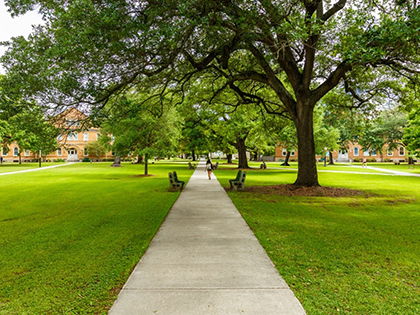The Problem

A Midwestern university, set on 105 acres in the Chicago suburbs, is a private, not-for-profit institution with over 3,000 regular campus visitors, including students and staff.
During the spring migration – typically February through May – Canada geese are drawn to the campus due to these attractive environmental characteristics:
- Large open spaces, provide open sightlines which enable birds to easily spot approaching threats
- Water and food source availability, on the campus property and neighboring 150-acre nature preserve, composed primarily of prairie and marsh habitats, are conducive to birds’ biological needs
- Nesting material availability, including twigs, mulch, grass, and other vegetation
In years past, with Canada geese numbers in the hundreds, university facilities staff were faced with maintenance problems, including:
- Property damage – one goose can eat up to three pounds of grass per day, which not only has an immediate, negative impact on the grass, but also heightens the soil’s pH levels, leading to poor turf health
- Human health and safety risks – the geese’s accumulated fecal matter and nest materials contaminated sections of campus and created conditions unsafe for recreation or working
Actions
In 2020, the University engaged Wild Goose Chase (WGC) to help reduce property damage and protect human health and safety from Canada geese during their spring migration.
WGC staff biologists assessed the campus and surrounding areas and determined that the most appropriate approach was a routine combination of:
Trained dogs are deployed multiple times per week at different times to harass the Canada geese. Canada geese perceive the dogs as a threat and leave campus property to protect their flock.
Nest and egg management are conducted in accordance with state regulations to reduce the overall presence of nuisance Canada geese.
This dual-service approach has been deployed between February and June every year since 2020.
Impact
Canada geese have incredible memories, which is why they tend to flock to the exact same locations each spring migration season, especially if those locations contain a multitude of attractive characteristics conducive to nesting.
At the University, the consistent application of canine harassment and ecological solutions on campus has reduced the presence of Canada geese by 78%.
The reduced presence of Canada geese has had tangible impacts for university facilities, including:
Reduced maintenance time
Significantly less time is now spent cleaning surfaces and rehabilitating the grounds due to accumulated fecal matter, enabling maintenance staff to focus on other campus needs and priorities.
Reduced property damage
The overall health of the grounds has improved substantially, as less grass is consumed and less fecal matter is produced by Canada geese.
Reduced human health and safety risks
The risk of contamination and/or unsafe working conditions from accumulated fecal matter has been drastically reduced (along with student and staff complaints).
Overall, the success of WGC’s holistic, science-guided approach has made the campus cleaner, safer, and more welcoming to students, staff and visitors.


